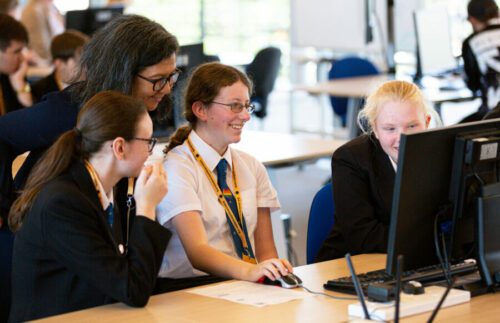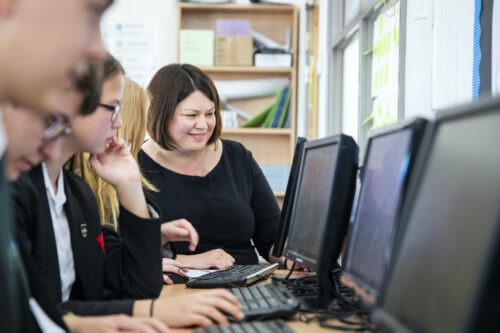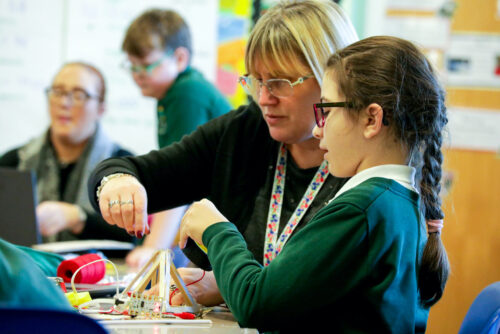Back in October, I wrote about a report that the Brookings Institution, a US think tank, had published about the provision of computer science in schools around the world. Brookings conducted a huge amount of research on computer science curricula in a range of countries, and the report gives a very varied picture. However, we believe that, to see a more complete picture, it’s also important to gather teachers’ own perspectives on their teaching.

Complete our survey for computing teachers
Experiences shared by teachers on the ground can give important insights to educators and researchers as well as to policymakers, and can be used to understand both gaps in provision and what is working well.
Today we launch a survey for computing teachers across Ireland and the UK. The purpose of this survey is to find out about the experiences of computing teachers across the UK and Ireland, including what you teach, your approaches to teaching, and professional development opportunities that you have found useful. You can access it by clicking one of these buttons:
The survey is:
- Open to all early years, primary, secondary, sixth-form, and further education teachers in Ireland, England, Northern Ireland, Scotland, and Wales who have taught any computing or computer science (even a tiny bit) in the last year
- Available in English, Welsh, Gaelic, and Irish/Gaeilge
- Anonymous, and we aim to make the data openly available, in line with our commitment to open-source data; the survey collects no personal data
- Designed to take you 20 to 25 minutes to complete
The survey will be open for four weeks, until 7 March. When you complete the survey, you’ll have the opportunity to enter a prize draw for a £50 book token per week, so if you complete the survey in the first week, you automatically get four chances to win a token!
We’re aiming for 1000 teachers to complete the survey, so please do fill it in and share it with your colleagues. If you can help us now, we’ll be able to share the survey findings on this website and other channels in the summer.
“Computing education in Ireland — as in many other countries — has changed so much in the last decade, and perhaps even more so in the last few years. Understanding teachers’ views is vital for so many reasons: to help develop, inform, and steer much-needed professional development; to inform policymakers on actions that will have positive effects for teachers working in the classroom; and to help researchers identify and conduct research in areas that will have real impact on and for teachers.”
– Keith Quille (Technological University Dublin), member of the research project team
What computing is taught in the UK and Ireland?
There are key differences in the provision of computer science and computing education across the UK and Ireland, not least what we all call the subject.
In England, the mandatory national curriculum subject is called Computing, but for learners electing to take qualifications such as GCSE and A level, the subject is called computer science. Computing is taught in all schools from age 5, and is a broad subject covering digital literacy as well as elements of computer science, such as algorithms and programming; networking; and computer architecture.

In Northern Ireland, the teaching curriculum involves developing Cross-Curricular Skills (CCS) and Thinking Skills and Personal Capabilities. This means that from the Early Years Foundation Stage to the end of key stage 3, “using ICT” is one of the three statutory CCS, alongside “communication” and “using mathematics”, which must be included in lessons. At GCSE and A level, the subject (for those who select it) is called Digital Technology, with GCSE students being able to choose between GCSE Digital Technology (Multimedia) and GCSE Digital Technology (Programming).
In Scotland, the Curriculum for Excellence is divided into two phases: the broad general education (BGE) and the senior phase. In the BGE, from age 3 to 15 (the end of the third year of secondary school), all children and young people are entitled to a computing science curriculum as part of the Technologies framework. In S4 to S6, young people may choose to extend and deepen their learning in computing science through National and Higher qualification courses.

In Wales, computer science will be part of a new Science & Technology area of learning and experience for all learners aged 3-16. Digital competence is also a statutory cross-curricular skill alongside literacy and numeracy; this includes Citizenship; Interacting and collaborating; Producing; and Data and computational thinking. Wales offers a new GCSE and A level Digital Technology, as well as GCSE and A level Computer Science.
Ireland has introduced the Computer Science for Leaving Certificate as an optional subject (age ranges typically from 15 to 18), after a pilot phase which began in 2018. The Leaving Certificate subject includes three strands: practices and principles; core concepts; and computer science in practice. At junior cycle level (age ranges typically from 12 to 15), an optional short course in coding is now available. The short course has three strands: Computer science introduction; Let’s get connected; and Coding at the next level.
What is the survey?
The survey is a localised and slightly adapted version of METRECC, which is a comprehensive and validated survey tool developed in 2019 to benchmark and measure developments of the teaching and learning of computing in formal education systems around the world. METRECC stands for ‘MEasuring TeacheR Enacted Computing Curriculum’. The METRECC survey has ten categories of questions and is designed to be completed by practising computing teachers.
Using existing standardised survey instruments is good research practice, as it increases the reliability and validity of the results. In 2019, METRECC was used to survey teachers in England, Scotland, Ireland, Italy, Malta, Australia, and the USA. It was subsequently revised and has been used more recently to survey computing teachers in South Asia and in four countries in Africa.

With sufficient responses, we hope to be able to report on the resources and classroom practices of computing teachers, as well as on their access to professional development opportunities. This will enable us to not only compare the UK’s four devolved nations and Ireland, but also to report on aspects of the teaching of computing in general, and on how teachers perceive the teaching of the subject. As computing is a relatively new subject whatever country you are in, it’s crucial to gather and analyse this information so that we can develop our understanding of the teaching of computing.
The research team
For this project, we are working as a team of researchers across the UK and Ireland. Together we have a breadth of experience around the development of computing as a school subject (using this broad term to also cover digital competencies and digital technology) in our respective countries. We also have experience of quantitative research and reporting, and we are aiming to publish the results in an academic journal as well as disseminate them to a wider audience.
In alphabetical order, on the team are:
- Elizabeth Cole, who researches early years and primary programming education at the Centre for Computing Science Education (CCSE), University of Glasgow
- Tom Crick, who is Professor of Digital Education & Policy at Swansea University and has been involved in policy development around computing in Wales for many years
- Diana Kirby, who is a Programme Coordinator at the Raspberry Pi Foundation
- Nicola Looker, who is a Lecturer in Secondary Education at Edgehill University, and a PhD student at CCSE, University of Glasgow, researching programming pedagogy
- Keith Quille, who is a Senior Lecturer in Computing at Technological University Dublin
- Sue Sentance, who is the Director of the Raspberry Pi Computing Education Research Centre at University of Cambridge; and Chief Learning Officer at the Raspberry Pi Foundation
In addition, Dr Irene Bell, Stranmillis University College, Belfast, has been assisting the team to ensure that the survey is applicable for teachers in Northern Ireland. Keith, Sue, and Elizabeth were part of the original team that designed the survey in 2019.
How can I find out more?
On this page, you’ll see more information about the survey and our findings once we start analysing the data. You can bookmark the page, as we will keep it updated with the results of the survey and any subsequent publications.
Website: LINK
